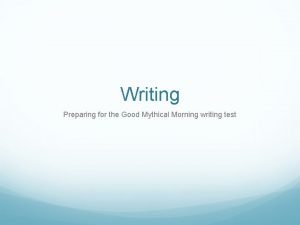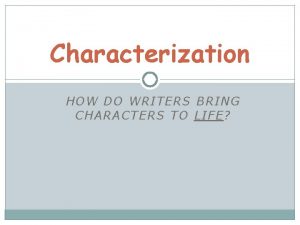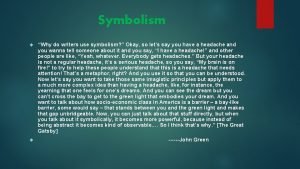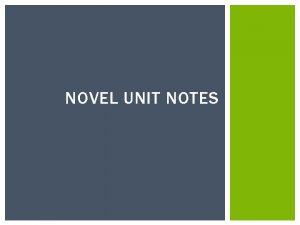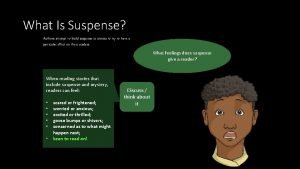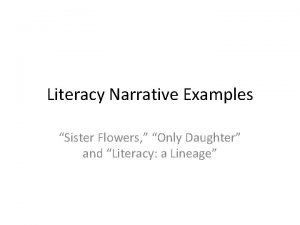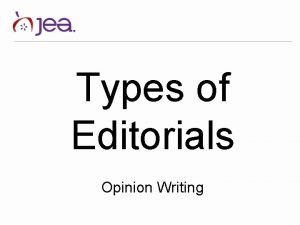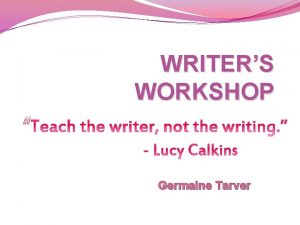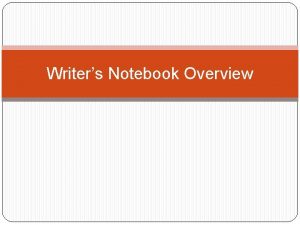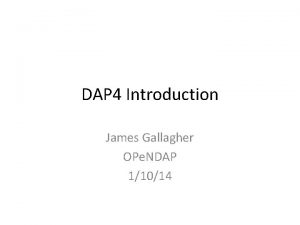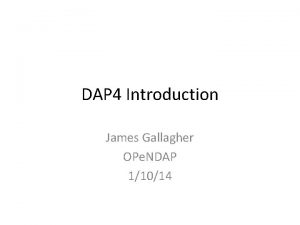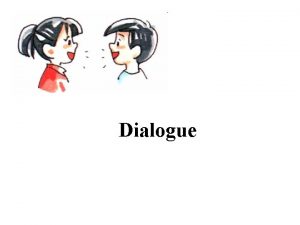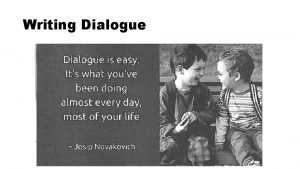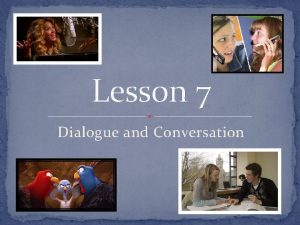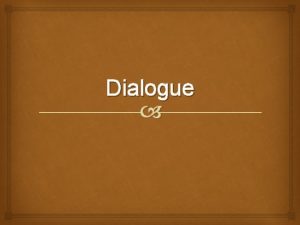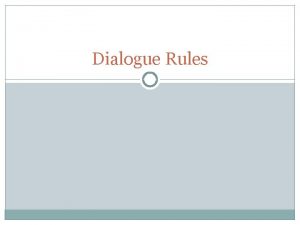11014 Dialogue 5 TP Good writers use dialogue















- Slides: 15

1/10/14 Dialogue 5 TP: Good writers use dialogue effectively. Bell work: Copy the sentences below, adding the appropriate punctuation. 1. he loved you she said hoping to provoke a reaction but you didnt care 2. where are you going he asked her turning red with anger you know youre grounded

Corrections 1. “He loved you, ” she said, hoping to provoke a reaction, “but you didn’t care. ” 2. “Where are you going? ” he asked her, turning red with anger. “You know you’re grounded!”

16/10/14 Dialogue 7 TP: Good writers use dialogue effectively. Bell work: Write down as many rules as you can think that apply when you write dialogue. (Can be rules related to punctuation or when to use dialogue)

Basic Rules of Punctuating Dialogue 1. Anything spoken by a character in a story must be contained within inverted commas. (either single or double may be used, but be consistent). 2. If a speech is broken in the middle, the inverted commas need to be closed and then re-opened: "It's a beautiful day, " she said. "What a shame we have to go to work. "

3. Every change of speaker usually requires a new paragraph. "It's a beautiful day, " she said. "What a shame we have to go to work. " "It certainly is, " he replied. 4. BUT if no-one else has spoken in the paragraph, it may be better to run the dialogue straight on. He glanced around the room. "It's not much to look at, is it? " he said.

5. Punctuation at the end of a speech should normally come before the inverted commas are closed. "It's not much to look at, is it”? he said. WRONG! 6. Dialogue must still be written in grammatical sentences. "You're a swine, " Miranda sobbed. "I hate you!“ NOT: "You're a swine!" Sobbing. "I hate you!"

7. Where a speech is continued over two or more paragraphs, re-open the inverted commas at the start of each new paragraph, but only close them at the end of the speech. ". . . so, overall, September was a good month for our company. "As for October, this month we’ve seen a slight downturn. It’s too soon to draw any conclusions from this, however. "

8. Where a “he said” or similar follows in the same sentence, the speech itself may close with a comma, exclamation mark or question mark, but not without punctuation or (even worse) with a full stop: "You always say that, " he said. BUT NOT: "You always say that" he said. OR: "You always say that. " he said. OR: “You always say that. ” He said.

Dull writing example Shameka decided that she really deserved an allowance. She had never gotten one, and lots of her friends did. She talked to her dad. It started as an argument, but it ended up okay because she ended up getting an allowance, not as much as she wanted, but at least it was a start.

Dialogue Revision “Dad, I need to talk to you, ” announced Shameka. “Honey, I’m really busy right now. Can it wait? ” “Actually, Dad, it’s already waited for 13 years. I think we are way overdue for this conversation. ” “Wait a minute, ” responded Dad. “I really don’t like being talked to like that. “What’s your problem? ” “My problem is that I’m not getting any support from you and Mom, ” Shameka yelled as she walked across the room and prepared to slam the door.

“STOP RIGHT THERE, young lady. You will not talk to me that way and you will not walk away. ” Dad paused and then calmly asked, “Please, will you tell me what’s bothering you? Obviously, there’s something rather important. What do you mean that we don’t support you? ” “OK, Dad, I’m sorry, ” apologised Shameka. “It’s just that my friends all get allowances and I don’t. When we go to the mall, I have to ask you for money. I want to have some money of my own that I can count on whenever I need it. ” Dad sighed and then he explained, “Shameka, Mom and I would really like to be able to give you

an allowance. We know that your friends have more money than you do, but it’s hard for us right now. I will talk to Mom about it, but until I do, how about if I give you 10 dollars this week? Mom and I will discuss it, and we’ll see what we can do. ” “Well, Dad, 10 dollars really doesn’t go very far these days, but I guess it’s a beginning. Please, tell Mom how much I want it, and tell her I’ll do more around the house and that I deserve it, OK? ” pleaded Shameka. Dad laughed, hugged Shameka, and promised, “I’ll do what I can.

Paired Work • Read the two narratives on the following slide. • Choose one of the paragraphs to revise by writing dialogue instead of only narrative. • Remember: use vivid vocabulary and to avoid the words said or tell.

19/10/14 Dialogue 8 TP: Complete the dialogue started last day Bell work: When should you include dialogue in your story?

• Tanya didn’t do her math homework last night, and she had hoped that Mr Jackson would not find out. Sometimes he just went over it quickly without checking if everyone had done it. When she got to class, however, they went over the homework, and he called on her. She was embarrassed, and she told him a lie in front of the class to explain why she didn’t have it. She felt guilty after class, and she stayed after to tell him the truth. • The neighbourhood boys were playing baseball in the street. They were having a great time until Donte hit a fly ball that went right into the Robertsons’ window. Glass • shattered everywhere, and Mr Robertson came out the door. All the boys ran, and Donte was left to explain and apologise to a very angry Mr Robertson. Donte agreed to pay for the window and to be sure it got fixed.
 Good mythical morning writers
Good mythical morning writers What is characterization in writing
What is characterization in writing Freedom writers symbols
Freedom writers symbols Why do writers use foreshadowing
Why do writers use foreshadowing Writers who use imagery
Writers who use imagery Foreshadowing in othello
Foreshadowing in othello Metaphors for suspense
Metaphors for suspense Narrative writers use techniques such as
Narrative writers use techniques such as Zoroastrian good thoughts
Zoroastrian good thoughts Hello, good evening
Hello, good evening Good afternoon students
Good afternoon students You are good when theres nothing good in me
You are good when theres nothing good in me Good afternoon buenas tardes
Good afternoon buenas tardes Regulation congratulation
Regulation congratulation Examples of dialogues
Examples of dialogues Four opinion writers
Four opinion writers
